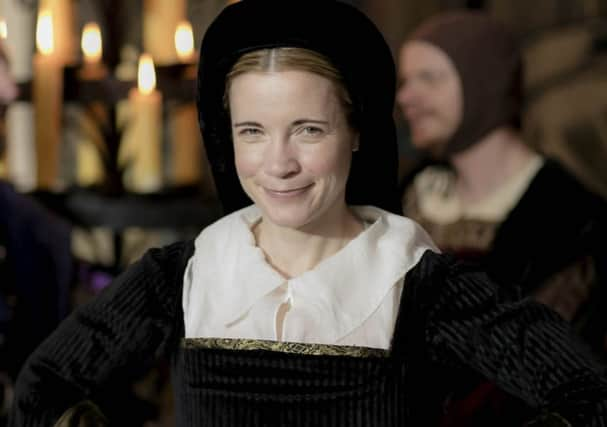Historian Lucy looks back at the lives of Henry VIII's many wives


History buff Lucy Worsley has made a royal impression exploring the past in the name of entertainment.
From washing Tudor linen in urine and spit-roasting mutton in If Walls Could Talk (her 2011 springboard into television, which took viewers through 800 years of domestic history), to donning a 1750s-style mantua dress and matching bonnet in Tales From The Royal Wardrobe, the 42-year-old presenter and author is renowned for her hands-on approach.
Advertisement
Hide AdAdvertisement
Hide AdHer latest landmark venture - Six Wives With Lucy Worsley - reads much the same.
Commissioned for BBC One, the three-part series - written by playwright Chloe Moss - combines dramatised scenes with Worsley’s own contemporary comment, as she journeys back to the Tudor court to witness some of the most dramatic moments in the lives of Henry VIII’s six wives.
To uncover the private moments reported by eyewitnesses or recorded in historical documents, time-travelling Worsley will adopt the perfect fly-on-the-wall position, dressed as a range of silent servants - from a maid to a midwife and a nursemaid.
“Some of you may have seen some of my programmes on BBC Four, and what normally happens is the director says, ‘Now we have a budget of £25 and we would really like some acting...’ And I say, ‘I’ll do it for you, I’ll do it for you!’” she explains of her choice to play dress-up.
Advertisement
Hide AdAdvertisement
Hide Ad“So I have been in my historic costumes in the past - sometimes for serious intent, sometimes for frivolous. I do really love it.”
Smiling wildly, Worsley, who read Ancient and Modern History at Oxford, notes: “What was amazing about this one, is the world we managed to create. As a museum curator [Worsley’s day job is chief curator of the Historic Royal Palaces], we do this as best we can, but we have to allow visitors to come in and they sometimes move and touch things, so you can’t do it to such a level as was done [for the series]. I found that absolutely fascinating.”
Telling the story through the eyes of the Queens - how they found their own unique methods of exerting influence at a time when the world was very much run by men and predominantly controlled by the King - also adds much to the mix.
“More than ever, it’s time,” Worsley reflects. “One thing that has really struck me over the last few weeks, and I’m sure you noticed this too, was when Hillary Clinton made that speech and she said, ‘For all the little girls watching...’, and I thought, ‘Well, that’s kind of the motto of our series’.
Advertisement
Hide AdAdvertisement
Hide Ad“The little details do add up into world-changing events,” she continues. “I have always veered myself towards social history and I absolutely don’t think that it’s trivial, because it’s the tiny details that together add up to tell big stories about big changes.”
She’s careful to note, however, a good history showcase requires more than expounding historic facts - it should incite passion, too.
“As historians, people are always asking me, ‘Is X accurate? Is Y accurate?’, and I am thinking, well, I can pass judgement on that, but I also want to know whether it’s going to engage, whether it is going to take people on an emotional journey - because that’s what makes them pick up a book, that’s what makes them sign up for an Open University degree, and that’s what gets them into the subject.”
But while Worsley - sporting her trademark blonde bob and dressed in a red and black floral dress for our interview - prefers to get stuck in, some of her counterparts have, in the past, taken a very different view to rebuilding the olden days.
Advertisement
Hide AdAdvertisement
Hide Ad“Lots of historians are sniffy about re-enactors,” the Reading-born academic told The Telegraph back in 2011. “I remember meeting someone very grand while I was making [If Walls Could Talk], who said, ‘Oh, I see you are going over to the dark side’.
“I have suffered from that thinking, too, that the documents we should be using are from archives and libraries. But you can learn a lot by recreating stuff.”
Does she think the modern format - quite the departure for BBC One - will attract a new audience, then?
“The sad thing is, there’s only immense influence in the Tudors, Queen Victoria...” she begins. “In terms of the broader history viewer, you’ve got to work really hard.
Advertisement
Hide AdAdvertisement
Hide Ad“I do like being on BBC Four as well,” offers the presenter, who now lives in London with her architect husband, Mark Hines. “I think that’s quite cool because it’s a good channel.”
So what’s next for the woman who has a nation’s rich and varied past to pluck from?
“Queen Victoria?” she quips, toying with ideas but keen to not give too much away. “She’s got a big anniversary coming up in 2019 [the year marks the historical monarch’s would-be 200th birthday], and one of our sites is Kensington Palace where she was born, so that’s a very Victorian.
“But we will have to see - you can’t always do what you want in life.”
Six Wives With Lucy Worsley begins on BBC One on Wednesday, December 7.